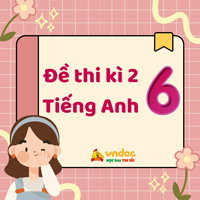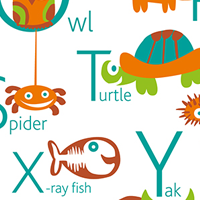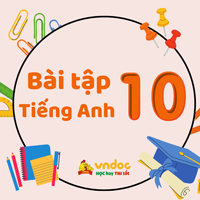Đề thi thử THPT Quốc gia môn tiếng Anh lần 1 trường THPT Ngô Sĩ Liên, Bắc Giang năm 2016
Đề ôn thi THPT Quốc gia môn tiếng Anh năm 2017
Đề thi thử THPT Quốc gia môn tiếng Anh lần 1 trường THPT Ngô Sĩ Liên, Bắc Giang năm 2016 gồm 64 câu hỏi trắc nghiệm, 5 câu hỏi viết và 1 phần thi tự luận. Đề thi diễn ra trong thời gian 90 phút và có đáp án tham khảo phía dưới đề, giúp các bạn học sinh luyện tập hiệu quả. Mời các bạn tham khảo.
Đề thi thử THPT Quốc Gia năm 2017 môn Tiếng Anh trực tuyến
Đề thi thử THPT Quốc gia môn tiếng Anh trực tuyến lần 1 trường THPT Ngô Sĩ Liên, Bắc Giang năm 2016
Đề thi thử THPT Quốc gia môn tiếng Anh lần 2 trường THPT Ngô Sĩ Liên, Bắc Giang năm 2016
Đề thi thử THPT Quốc gia môn Tiếng Anh năm 2016 - THPT Hàm Long online
Đề thi thử môn Anh THPT Quốc gia năm 2016 trực tuyến (Giải thích chi tiết Key)
SỞ GD&ĐT BẮC GIANG TRƯỜNG THPT NGÔ SĨ LIÊN Đề thi có 06 trang | ĐỀ THI THỬ KỲ THI THPT QUỐC GIA LẦN 1 Năm học 2015 - 2016 Môn: TIẾNG ANH LỚP 12 Thời gian làm bài: 90 phút (Không kể thời gian phát đề) |
Mã đề thi 156
SECTION A (8 points)
Mark the letter A, B, C, or D on your answer sheet to indicate the word whose underlined part differs from the other three in pronunciation in each of the following questions.
Question 1. A. attracted B. attended C. confided D. promised
Question 2. A. communication B. culture C. ceremony D. compliment
Mark the letter A, B, C, or D on your answer sheet to indicate the word that differs from the other three in the position of primary stress in each of the following questions.
Question 3. A. attract B. decide C. precede D. culture
Question 4. A. determine B. tradition C. sacrifice D. terrific
Question 5. A. informality B. socialise C. mischievous D. confidence
Mark the letter A, B, C, or D on your answer sheet to indicate the correct answer to each of the following questions.
Question 6. Thank you for your compliment _______ my achievements.
A. to B. with C. from D. on
Question 7. I'm afraid a rise in salary is _______ just now.
A. out of sight B. out of the question C. out of control D. out of date
Question 8. They laughed a lot last night. The film _______ have been very funny.
A. can B. would C. ought D. must
Question 9. After the test papers _______ to the students in class tomorrow, the students _______ their next assignment.
A. will return – will be given B. will be returned – are given
C. are returning – are giving D. are returned – will be given
Question 10. I have not found the book _______ our teacher advised us to read.
A. whom B. which C. who D. when
Question 11. If he had tried his best, he _______ accepted to that university.
A. would have B. would have been C. would be D. will be
Question 12. He'd prefer _______ chicken soup rather than _______ eel soup.
A. to have – have B. have – have C. to have – having D. having – to have
Question 13. Barbara is motivated to study _______ she knows that a good education can improve her life.
A. although B. so that C. because D. but
Question 14. My family is the base from which we can go into the world with _______.
A. confide B. confidence C. confident D. confiding
Question 15. _______ signals such as waving, nodding or shaking of the head also have cultural meanings.
A. Verbal B. Non-verbal C. Visual D. Oral
Question 16. Air is _______ mainly of nitrogen and oxygen.
A. created B. consisted C. composed D. included
Question 17. It is important to have someone you can confide _______.
A. from B. to C. in D. with
Question 18. I admired the _______ cars at the car show.
A. expensive new German B. new expensive German
C. German expensive new D. new German expensive
Question 19. A quick look would reveal that France has _______ computers.
A. as many twice televisions as B. twice more televisions than
C. twice as many televisions as D. as twice many televisions as
Question 20. Your grades are coming down. You should try to _______ the other students in your class.
A. get out of B. get along with C. keep away from D. keep up with
Question 21. Only when you become a parent _______ what true responsibility is.
A. you will understand B. will you understand
C. you understand D. you can understand
Question 22. It is essential that every student _______ the exam before attending the course.
A. passes B. passed C. pass D. would pass
Question 23. Mickey: "_______"
Minnie: "Oh, thank you. I just got it yesterday"
A. That's a beautiful dress you are wearing.
B. When did you buy this beautiful dress?
C. Who gave you this beautiful dress?
D. You've just bought this beautiful dress, haven't you?
Question 24. Teacher: "Tom, you've written a much better essay this time."
Tom: "_______"
A. Writing? Why? B. Thank you. It's really encouraging.
C. You're welcome. D. What did you say? I'm so shy.
Mark the letter A, B, C, or D on your answer sheet to indicate the word(s) CLOSEST in meaning to the underlined word(s) in each of the following questions.
Question 25. Many education courses require both oral and written presentations before degrees are awarded.
A. prepared B. spoken C. excellent D. understood
Question 26. Although he is recognized as one of the most brilliant scientists in his field, Professor White cannot seem to make his ideas understood in class.
A. get his ideas down B. recall his ideas
C. summarize his ideas D. get his ideas across
Question 27. Professor Berg was very interested in the diversity of cultures all over the world.
A. variety B. changes C. conservation D. number
Mark the letter A, B, C, or D on your answer sheet to indicate the word(s) OPPOSITE in meaning to the underlined word(s) in each of the following questions.
Question 28. I would be happy to go along with the idea.
A. to disagree with the idea B. to agree with the idea
C. to support the idea D. to approve with the idea
Question 29. He had never experienced such discourtesy towards the president as it occurred at the annual meeting in May.
A. politeness B. rudeness C. measurement D. encouragement
Mark the letter A, B, C, or D on your answer sheet to indicate the underlined part that needs correction in each of the following questions.
Question 30. The number of students attending the seminar are smaller than registration numbers.
A B C D
Question 31. Preceding by four nice children, the bride and the groom entered the wedding hall.
A B C D
Question 32. The examination will test your ability to understand spoken English, to read non-technical
A B C
language, and writing correctly.
D
Question 33. The better the weather is, the most crowded the beaches get.
A B C D
Question 34. It's about time you decide whether to enter university or get a job.
A B C D
Read the following passage and mark the letter A, B, C, or D on your answer sheet to indicate the correct word or phrase that best fits each of the numbered blanks from 35 to 44.
Speech is one of the most important (35)___ of communicating .It consists of far more than just making noises . To talk and also (36)___ to by other people, we have to speak a language ,that is, we have to use combinations of (37)____that everyone agrees to stand for a particular object or idea. Communication would be impossible if everyone made up their own language. Learning a language properly is very (38)___. The basic (39)____of English is not very large, and not only about 2,000 words are needed to speak it quite (40)___.But the more idea you can (41)____ the more precise you can be about their exact meaning. Words are the (42)____thing we use in communicating what we want to say. The way we (43)____the words is also very important. Our tone of voice can express many emotions and (44)____ whether we are pleased or angry, for instance.
Question 35. A. reason B. tests C. rules D. ways
Question 36. A. be spoken B. be examined C. be understood D. be talked
Question 37. A. systems B. sounds C. languages D. talks
Question 38. A. easy B. important C. simple D. expensive
Question 39. A. grammar B. word C. vocabulary D. structure
Question 40. A. fluent B. good C. perfect D. well
Question 41. A. need B. grow C. express D. pass
Question 42. A. main B. certain C. full D. most
Question 43. A. talk B. say C. pass D. send
Question 44. A. show B. ask C. understand D. know
Read the following passage and mark the letter A, B, C, or D on your answer sheet to indicate the correct answer to each of the questions from 45 to 54.
Although speech is the most advanced form of communication, there are many ways of communicating without using speech. Signals, signs, symbols, and gestures may be found in every known culture. The basic function of signal is to impinge upon the environment in such a way that it attracts attention, as, for example, the dots and dashes of a telegraph circuit. Coded to refer to speech, the potential for communication is very great. Less adaptable to the codification of words, signs also contain meaning in and of themselves. A stop sign or a barber pole conveys meaning quickly and conveniently.
Symbols are more difficult to describe than either signals or signs because of their intricate relationship with the receiver's cultural perceptions. In some cultures, applauding in a theater provides performers with an auditory symbol of approval. Gestures such as waving and handshaking also communicate certain cultural messages.
Although signals, signs, symbols, and gestures are very useful, they do have a major disadvantage in communication. They usually do not allow ideas to be shared without the sender being directly adjacent to the receiver. Without an exchange of ideas, interaction comes to a halt. As a result, means of communication intended to be used for long distances and extended periods must be based upon speech. To radio, television, and the telephone, one must add fax, paging systems, electronic mail, and the Internet, and no one doubts but that there are more means of communication on the horizon.
Question 45. Which of the following would be the best title for the passage?
A. Gestures B. Signs and signals C. Speech D. Communication
Question 46. What does the author say about speech?
A. It is dependent upon the advances made by inventors.
B. It is the most advanced form of communication.
C. It is necessary for communication to occur.
D. It is the only true form of communication.
Question 47. According to the passage, what is a signal?
A. A form of communication that interrupts the environment.
B. The most difficult form of communication to describe.
C. A form of communication which may be used across long distances.
D. The form of communication most related to cultural perception.
Question 48. The phrase "impinge upon" in paragraph 1 is closest in meaning to _______.
A. prohibit B. intrude C. vary D. improve
Question 49. The word "it" in paragraph refers to ________.
A. way B. environment C. function D. signal
Question 50. The word "potential" in paragraph 1 could be replaced by _______.
A. advantage B. possibility C. organization D. range
Question 51. The word "intricate" in paragraph 2 could best be replaced by _______.
A. inefficient B. complicated C. historical D. uncertain
Question 52. Applauding was cited as an example of _______.
A. a signal B. a sign C. a gesture D. a symbol
Question 53. Why were the telephone, radio, and television invented?
A. Because people were unable to understand signs, signals, and symbols.
B. Because people wanted to communicate across long distances.
C. Because people believed that signs, signals, and symbols were obsolete.
D. Because people wanted new forms of communication.
Question 54. It may be concluded from this passage that_______.
A. only some cultures have signs, signals, and symbols
B. signs, signals, symbols, and gestures are forms of communication
C. symbols are very easy to define and interrupt
D. waving and handshaking are not related to culture
Read the following passage and mark the letter A, B, C, or D on your answer sheet to indicate the correct answer to each of the questions from 55 to 64
A recent study shows that an unequal share of household chores is still the norm in many households, despite the fact that many more women now have jobs. In a survey of 1,256 people ages between 18 and 65, men said they contributed an average of 37% of the total housework, while the women estimated their share to be nearly double that, at 70%. This ratio was not affected by whether the woman was working or not.
When they were asked what they thought was a fair division of labor, women with jobs felt that housework should be shared equally between male and female partners. Women who did not work outside the home were satisfied to perform 80% - the majority of the household work – if their husbands did remainder. Research has shown that, if levels increase beyond these percentages, women become unhappy and anxious, and feel they are unimportant.
After marriage, a woman is reported to increase her household workload by 14 hours per week, but for men the amount is just 90 minutes. So the division of labor becomes unbalanced, as a man's share increases much less than the woman's. It is the inequality and loss of respect, not the actual number of hours, which leads to anxiety and depression. The research describes housework as thankless and unfulfilling. Activities included in the study were cooking, cleaning, shopping, doing laundry, washing up and childcare. Women who have jobs report that they feel overworked by these chores in addition to their professional duties. In contrast, full-time homemakers frequently anticipate going back to work when the children grow up. Distress for this group is caused by losing the teamwork in the marriage.
In cases where men perform most of the housework, results were similar. The men also became depressed by the imbalance of labor. The research showed that the least distressed people are those who have equal share, implying that men could perform significantly more chores and even benefit from this. The research concludes "Everybody benefits from sharing the housework. Even for women keeping house, a share division of labor is important. If you decide to stay at home to raise the children, you don't want to become the servant of the house".
Question 55. The word remainder in paragraph 2 is closest in meaning to ______ .
A. what is done B. what is fulfilled C. what is left D. what is share
Question 56. Although women think men should share the housework, those who don't have paid job agree to share ______ of the chores.
A. 14% B. 37% C. 70% D. 80%
Question 57. After getting married, ______ .
A. women have a bigger house B. men do more housework
C. men do less housework D. women do twice as much housework
Question 58. Working women ______ .
A. want their partners to do an equal share
B. are anxious and depressed
C. do 80% of the household
D. would prefer not to have a job
Question 59. Women who do not have a job become depressed ______ .
A. if they have to do more than half of the housework
B. because they have no respect
C. when their husbands do not help them
D. if their husbands do 20% of the chores
Question 60. The word norm in paragraph 1 is closest in meaning to ______ .
A. changing thing B. strange thing C. usual thing D. unequal thing
Question 61. According to the passage, a good relationship is the one in which ______ .
A. men do more housework than women
B. women and men divide the housework equally
C. women do 80% of the housework
D. women do 14 hours of housework
Question 62. Objects of the survey were ______ .
A. people of a wide range of ages B. married people
C. working people D. unemployed people
Question 63. The word estimated in paragraph 1 is closest in meaning to ______ .
A. wanted B. divided C. hoped D. guessed
Question 64. What is the most suitable heading for the passage?
A. Difficulties of working women B. Unequal housework division
C. Reason for women to be distress D. How to be happy couples
SECTION B (2 points)
I. Finish each of the following sentences in such a way that it means the same as the sentence printed before it. Write your answers on your answer sheet.
Question 1. The play started as soon as we arrived at the theatre.
Hardly____________________________________________________________________________
Question 2. The roses are so beautiful that everyone seeing them pays compliments.
They______________________________________________________________________________
Question 3. We could see the view of the ocean only after the rain stopped.
Not until___________________________________________________________________________
Question 4. It was wrong of you not to call the fire brigade at once.
You_______________________________________________________________________________
Question 5. "If I were in your shoes, I would try to finish the pre-lab report before carrying out the experiment," said the professor to his research student.
The professor advised________________________________________________________________
II. In about 140 words, write a paragraph about some typical features of Vietnamese culture. Write your paragraph on your answer sheet.
Đáp án đề thi thử THPT Quốc gia môn tiếng Anh
1. D 2. C 3. D 4. C 5. A 6. D 7. B 8. D | 9. D 10. B 11. B 12. A 13. C 14. B 15. B 16. C | 17. C 18. A 19. C 20. D 21. B 22. C 23. A 24. B | 25. B 26. D 27. A 28. A 29. A 30. C 31. A 32. D | 33. C 34. B 35. D 36. C 37. B 38. B 39. C 40. D | 41. C 42. A 43. B 44. A 45. D 46. B 47. A 48. B | 49. D 50. B 51. B 52. D 53. B 54. B 55. C 56. D | 57. B 58. A 59. C 60. C 61. B 62. A 63. D 64. B |
SECTION B (2 points)
I. 0.1 x 5 = 0.5
Question 1. Hardly had we arrived at the theatre when the play started.
Question 2. They are such beautiful roses that everyone seeing them pays compliments.
Question 3. Not until the rain stopped could we see the view of the ocean.
Question 4. You should have called the fire brigade at once.
Question 5. The professor advised his research student to try to finish the pre-lab report before carrying out the experiment.
II. 1.5
1. Bố cục (0,40 điểm)
- Câu đề dẫn chủ đề mạch lạc
- Bố cục hợp lí rõ ràng phù hợp yêu cầu của đề bài o Bố cục uyển chuyển từ mở bài đến kết luận
2. Phát triển ý (0,25 điểm)
- Phát triển ý có trình tự logic
- Có dẫn chứng, ví dụ, ... đủ để bảo vệ ý kiến của mình
3. Sử dụng ngôn từ (0,30 điểm)
- Sử dụng ngôn từ phù hợp nội dung
- Sử dụng ngôn từ đúng văn phong / thể loại
- Sử dụng từ nối các ý cho bài viết uyển chuyển
4. Nội dung (0,30 điểm)
- Đủ thuyết phục người đọc
- Đủ dẫn chứng, ví dụ, lập luận
- Độ dài: Số từ không nhiều hơn hoặc ít hơn so với quy định 5%
5. Ngữ pháp, dấu câu, và chính tả (0,25 điểm)
- Sử dụng đúng dấu câu
- Chính tả: Viết đúng chính tả
- Lỗi chính tả gây hiểu nhầm / sai lệch ý sẽ bị tính một lỗi (trừ 1% điểm của bài viết)
- Cùng một lỗi chính tả lặp lại chỉ tính là một lỗi
- Sử dụng đúng thời, thể, cấu trúc câu đúng ngữ pháp. (Lỗi ngữ pháp gây hiểu nhầm / sai lệch ý sẽ bị trừ 1% điểm bài viết)










